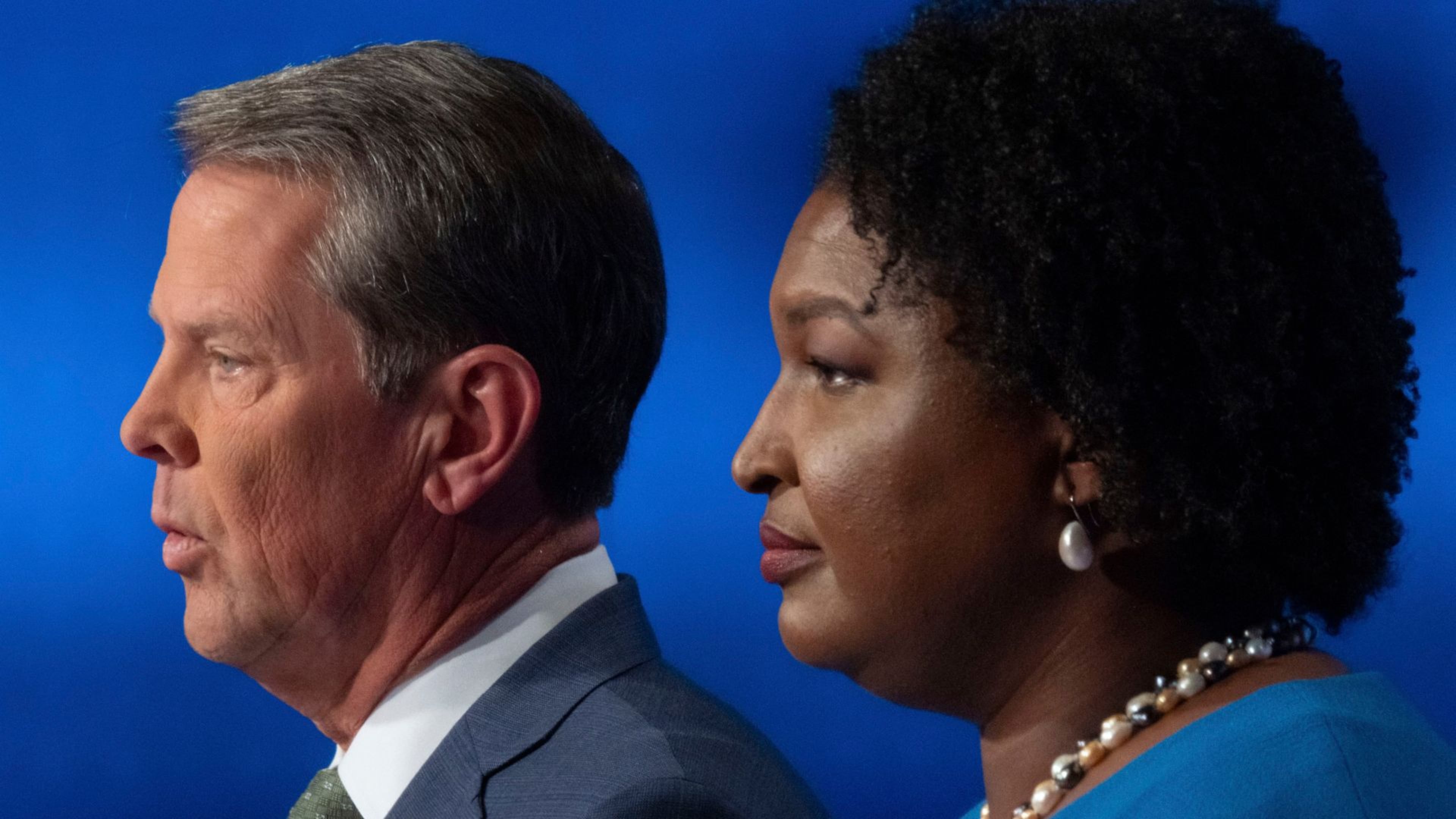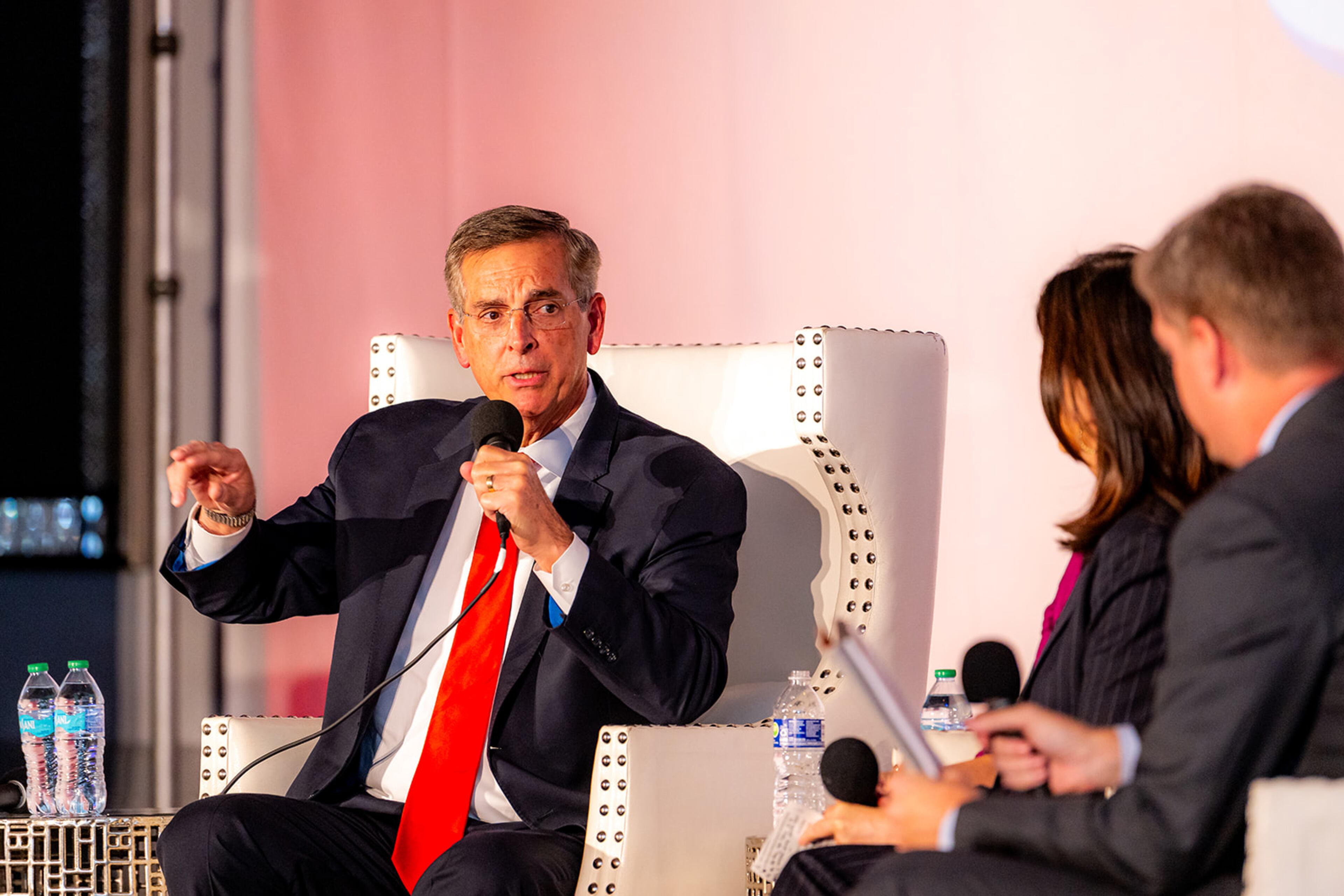This year’s election sets the stage for an equally wild and expensive 2026 race in Georgia

Georgia voters could make or break the campaigns of Donald Trump and Kamala Harris next week. But the November election will also serve as the unofficial starting bell for a 2026 race featuring an explosive, and costly, contest for most of Georgia’s top offices.
For months, ambitious Georgia politicians have said they’re too focused on helping their candidate win the White House to discuss the 2026 election, when U.S. Sen. Jon Ossoff stands for a second term and Georgians will decide a wide-open governor’s race.
But the maneuvering already underway will kick into another gear after the election, as some of the biggest names in Georgia politics roll out plans to seek higher office or stay put. And those moves will set off a chain effect as dozens of politicians join the mix for down-ticket seats.
“As soon as the votes in Georgia are tallied,” said DeKalb chief executive Michael Thurmond, “the race for 2026 begins.”
Thurmond is on a long list of potential Democratic contenders for governor that includes Jason Carter, the party’s 2014 gubernatorial nominee, and U.S. Rep. Lucy McBath, the gun control advocate who defied repeated GOP attempts to draw her out of office.
The Republican universe of contenders for premier offices is even longer since the GOP must also field a Senate candidate, and there’s a perpetual guessing game among party leaders over which big-name figures will line up for which job.
Wealthy MAGA warriors Lt. Gov. Burt Jones and former U.S. Sen. Kelly Loeffler have positioned themselves for a run. So have more mainstream Republicans like Attorney General Chris Carr and U.S. Reps. Buddy Carter and Drew Ferguson. Then there’s Secretary of State Brad Raffensperger, who has demonstrated crossover appeal.
Looming over it all is a pair of questions involving two figures whose rivalry has shaped Georgia politics over the last decade but, for once, are not on a collision course in another midterm election: Gov. Brian Kemp and Democrat Stacey Abrams.
The term-limited Republican governor, who has a 56% approval rating in an Atlanta Journal-Constitution poll this month, must soon decide whether he will sit out 2026 and prepare for a potential White House bid or challenge Ossoff, whose 2021 victory helped flip control of the U.S. Senate.

Once, Kemp’s close friends said he was more likely to run for president than Senate. Now, some indicate his calculus could change, especially if Republican leaders intensify the pressure — and promise substantial resources — if Kemp commits to challenging Ossoff. They also don’t expect a speedy decision.
Kemp may be the only GOP candidate who could spare Republicans a nasty primary battle that Ossoff and his allies could exploit. And Kemp allies see him as one of the few who can reliably win split-ticket voters while also energizing the conservative pro-Trump base.
Another factor is whether Trump — whether in office or political exile — chooses to pick a new fight with the governor. The two have reached a tenuous alliance since Trump berated Kemp in August in Atlanta, but there’s no telling how long that peace will hold.
Top Republicans say it would be a mistake to underestimate Ossoff, who also enjoys a positive rating in the AJC poll and likes to say that he’s more focused on small-town sewer systems than the drama of cable news. They also expect the field of top GOP candidates to freeze until Kemp’s decision.
“Trump is a national influencer,” said Jay Morgan, a lobbyist who was once the Georgia GOP’s executive director. “Kemp is the Georgia influencer on every level.”
An Abrams unknown
The other big unknown is whether Abrams will compete for a third time for governor.
After two straight defeats in gubernatorial contests, the voting rights advocate is no longer the dominant force in Georgia Democratic politics she was during her previous campaigns. Nor is she at the epicenter of the national conversation about Georgia Democrats.
Other Democrats have emerged as rising stars since Abrams’ narrow 2018 defeat to Kemp proved the party had a path to success in Georgia. At the party’s nominating convention in Chicago, coveted speaking slots were awarded to Carter, McBath and U.S. Sen. Raphael Warnock. And U.S. Rep. Nikema Williams, the party’s chairwoman, is among the state Democrats who have played more central roles in the day-to-day campaign.

“Abrams paved the way for the Democratic Party’s successes, but her campaign’s decline with voters in 2022 and the rise of others who can raise the money and have a strong legislative track record means that she’ll have stiff competition should she decide to run,” said veteran Democratic strategist Fred Hicks.
Few doubt Abrams would be a formidable force in a Democratic primary dominated by Black women. She has near universal name recognition in Georgia and can marshal a legion of volunteers and an army of donors. Still, several potential rivals indicate they could run regardless of whether Abrams enters the race.
“Every time someone said something to me of that nature — that ‘we would love to support you for governor’ — I’m really humbled,” McBath said at a “Politically Georgia” event this month.
“I’m very humbled that people believe that I have the ability to govern and to govern wisely and with common sense and with their best interests at heart.”

And Thurmond said in an interview that Democrats need to reposition the party to narrow the gender gap with men in statewide races if the party aims to stay competitive.
“We have to win those voters back if we’re going to be viable in 2026 and beyond. We can’t just be a party that appears to rely on college-educated elites,” said Thurmond, who was the first Black Georgian elected statewide without prior appointment when he won the first of three terms as labor commissioner in 1998.
“We have to expand the tent. There’s just not enough votes there.”
A 2026 guessing game
What happens next week will help shape all those decisions. Much will be decided based not just on whether Trump or Harris wins, but also by the margin of their success in Georgia.
A blowout Trump victory in Georgia, for instance, might dissuade some Democrats from gambling on a race for governor, an office the GOP has controlled since 2002. And Trump’s return to the White House could take some potential Republican candidates off the board. Loeffler, Trump’s top donor in Georgia, and state Sen. Brandon Beach are among several Georgians who could be in line for a federal appointment.

But a closer Trump victory could offer Democrats an opening to tie Republican contenders to his polarizing record. Former state Sen. Jen Jordan, a Democrat who ran for attorney general in 2022 put it this way: “If Trump wins, everybody is going to be in trouble if they’re a Republican.”
Likewise, some Republicans quietly speculate Trump’s defeat could hold its own advantages, particularly if he captures Georgia. It means GOP candidates can trumpet that they helped the former president recapture the state while using Harris as a foil for their campaigns.
Jones, the lieutenant governor expected to compete for Kemp’s job, said the race is likely to get off to a quick start.
“You’ll probably have plenty of folks out there jockeying early on. Because everyone thinks there’s some sort of magic to getting out there first,” Jones said, before downplaying his own timeline: “If I start talking about another election cycle, my wife will kick me out of the house so quick.”
A MAGA primary?
He’s already knee-deep in another battle — not for voters, but for Trump’s favor in 2026. Many Republicans calculate that even a Trump defeat won’t diminish the former president’s standing among loyalists who overwhelmingly supported him during the last three White House campaigns.
Jones seems to have an early edge in that pursuit. He’s one of several of Republicans who regularly speak at his Georgia rallies — a group that also includes Loeffler, U.S. Rep. Marjorie Taylor Greene and former U.S. Rep. Doug Collins. And Jones recently headlined his own event for Trump, a “faith” town hall in rural Zebulon.
Then there are the potential Republican office-seekers who, as Morgan puts it, must “have a strategy to mitigate his potential endorsement.”
Chief among them is Raffensperger, who famously rejected the then-president’s demand to “find” exactly enough votes to overturn his defeat. In a recent Politically Georgia event, Raffensperger said he’s confident he can find a lane should he run for governor or U.S. Senate.
“This is America. This is the land of opportunity and I think this is the land of integrity, honesty, decency and respectfulness. People are good in Georgia,” Raffensperger said. “It will be probably tough, but we’ll take it one day at a time.”
As for Kemp, he’s quick to snuff out any discussion of his political future. When a supporter at a Republican event in Atlanta’s suburbs began a “Kemp for Senate” chant a few days ago, the governor immediately quieted the cheering crowd.
“We need to stay focused on winning 2024 and not get distracted,” Kemp said, shaking his head. “We’ve got to work. We’ve got to get the vote out. And don’t rest until we do that.”




